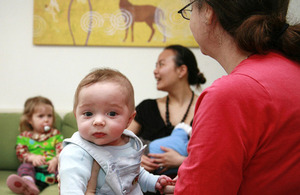Insight into the social interactions of babies helps reveal how infections spread
A new collaborative study provides valuable information on the best strategies to protect babies from infections.

A group of mothers and babies
A new collaborative study, from Public Health England (PHE) and parenting club, Bounty, found infants have little contact with adolescents and spend more time with their mothers than anyone else, providing valuable information on the best strategies to protect this age group from infections.
The study, published today (17 October 2013) in PLOS ONE, is the first of its kind and focuses on contact patterns of infants to assess and predict risks of transmitting infectious diseases. The study followed 115 healthy infants for 24 hours and tracked the duration and type of interaction they had with each individual they came into contact with.
The study reveals infants interact with on average 7 people a day, but this ranged from between 1 and 19 people. Around 55% of all newborn contacts occurred with people outside of the household. These social interactions help highlight where exposure to infectious diseases may occur.
Key findings from the study, which split the 115 infants in two groups: under 10 weeks old and aged between 11 weeks to 12 months old, reveal:
- older infants had less than 50% of all contact at home, with slightly higher contact in settings outside the household such as in GP practices, mother-and-baby groups, shopping centres and parks
- younger infants had intense contact within households lasting over 4 hours (44%)
- 92% of the mothers in the study had long physical contact with the infant, compared to 45% of the same contact made with siblings
- the babies had more contact with females (60%) than males
- the least amount of contact was with adolescents
Study author Dr Albert Jan van Hoek, an infectious disease expert at PHE, said:
Knowledge of the contact patterns of babies is essential to understand who is most likely to infect them and what the best strategies are to protect them from infections until they are old enough to be vaccinated themselves.
Although babies have intense interaction with their mother, father and siblings, they still see a lot of people outside of their immediate family.
The best way parents can protect their children is to ensure they receive their routine childhood vaccination on time. PHE will use the newly collected data to improve their transmission models of infectious diseases.
ends
Notes to editors:
- [Journal Reference] Jan van Hoek and others, The social life of infants in the context of infectious disease transmission; social contacts and mixing patterns of the very young, PLOS ONE.
- The survey was sent to a random selection of 1,000 mothers with infants under 12 months of age, with a focus on those aged up to 10 weeks. The surveys were distributed by PHE to Bounty members, 115 mothers returned the contact diary/answered the questionnaire that were in contact with 758 individuals. The overall response rate was 12%.
- Potential limitations include the sample size such as no responses recorded on a day at the nursery meaning contact levels recorded could differ if selecting a larger, or longer period study group.
- Bounty is a parenting club which provides support to pregnant women and mothers. Bounty provided a balanced random sample of first-time mums and those who have other children over different socio-economic groups.
- About PLOS ONE: PLOS ONE publishes primary research from all areas of science and employs a combination of peer review and post-publication rating and commenting, to maximize the impact of every report it publishes. We are published by the Public Library of Science (PLOS), the open-access publisher whose goal is to make the world’s scientific and medical literature a public resource. All works published in PLOS ONE are Open Access.
- Public Health England’s mission is to protect and improve the nation’s health and to address inequalities through working with national and local government, the NHS, industry and the voluntary and community sector. PHE is an operationally autonomous executive agency of the Department of Health. To find out more visit our website www.gov.uk/phe or follow us on Twitter @PHE_uk
UKHSA press office: National Infection Service
UKHSA press office, infectious diseases
61 Colindale Avenue
London
NW9 5EQ